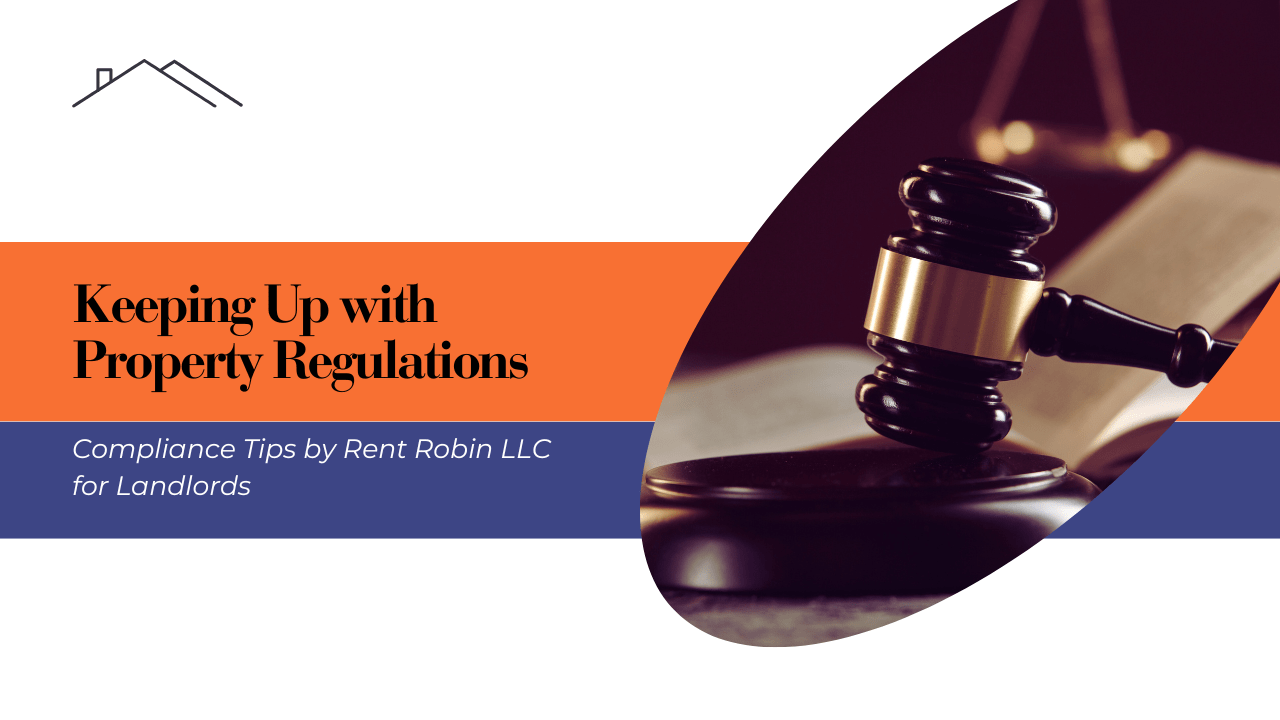
Missouri has a set of landlord/tenant laws and property regulations that you’ll need to be aware of when you’re renting out a home here. At Rent Robin LLC, we are careful about staying up to date with all of the laws, ordinances, and legal complexities that exist on a state, local, and federal level. Compliance is not optional; if you break a rental law, you could face thousands of dollars of fines and other additional penalties.
Let’s take a look at some of the most important rental regulations in Missouri, and our tips for remaining in compliance.
St. Louis Property Management Licensing
Property managers in St. Louis who lease and manage your home must have a real estate broker’s license. Under the Missouri real estate licensing laws, leasing a home is considered a real estate brokerage service.
Don’t worry: this does not mean that you need a broker’s license to manage your property.
If you’re renting out a home you once lived in yourself, or you are self-managing a couple of units in a building, a license isn’t necessary. However, if you’re hiring a professional St. Louis property management company, make sure they are licensed. You can do a license search with the Missouri Real Estate Commission.
Habitability Laws for Landlords and Owners in Missouri
Habitability laws are regulations that require landlords to maintain rental properties in a condition fit for tenants to live safely and comfortably. These laws ensure that essential services and structural integrity are upheld, providing tenants with a livable environment.
In Missouri, these standards are primarily governed by state landlord-tenant laws, which outline the responsibilities and rights of both landlords and tenants.
Your main responsibility as a landlord is to provide a safe and habitable home for your tenants to live in. You cannot neglect the repairs that are needed. Tenants must have heat, running water, and electricity. It’s important to disclose whether there’s any lead paint on the property, and you have to respond immediately to mold, pests, and other problems.
Compliance with fire safety regulations is also critical. This includes installing smoke detectors in appropriate locations, providing fire extinguishers where required, and ensuring that all exits are unobstructed and easily accessible.
Don’t put yourself at risk for legal issues and tenant disputes because of habitability issues. Invest in preventative maintenance and conduct thorough inspections to make sure your property is ready for occupancy.
Missouri Security Deposit Law
Security deposits in Missouri cannot exceed the equivalent of two months’ rent.
Unlike other states, there are no requirements around what kind of bank account you keep the deposit in and whether you have to pay interest to your tenants. You have a lot of freedom once you collect the deposit, and we always recommend that you keep it in a separate account, and document what you collected and where it’s held in your lease agreement. This leads to more transparency and better organization. It also protects the tenant’s deposit from co-mingling with your funds.
The law does state that you must return the deposit to your tenant within 30 days of the end of the lease when the tenant moves out. There are specific reasons you can withhold money from that deposit, and they include:
For payment of rent that is owed to the landlord;
To make repairs and restore the rental property to its original condition, except for regular wear and tear (which is the financial responsibility of the landlord); and,
Compensation paid to the landlord for actual damages that result from the tenant’s failure to give sufficient notice to terminate the lease, providing the landlord has made reasonable attempts to mitigate the damages
If you do withhold all or some of the deposit to cover any of these specifics, you need to provide an itemized list to the departing tenant of what was withheld and why.
Security deposit mistakes in Missouri are expensive. The tenant can recover up to twice the amount wrongfully withheld by the landlord if the security deposit is not returned in a way that’s compliant with Missouri state law.
Fair Housing Laws
Missouri’s state fair housing laws follow federal regulations, which protect people against discrimination based on seven protected classes.
The federal Fair Housing Act prevents you from discriminating against tenants or applicants based on:
Color
Race
Disability
Familial status
National origin
Religion
Sex (including sexual orientation and gender identity)
Be careful in your marketing. You might not intentionally discriminate, but if you mention that your property is located next to churches or that it’s “not suited for children,” you may be violating the fair housing laws. Screen every application consistently and provide a written list of rental criteria so potential applicants know what you’re looking for. A written process that’s verified and followed can help you avoid discrimination.
You have to allow service and support animals in your property, even if you don’t allow pets. If you say no to a tenant who needs a service or support animal or if you charge a pet deposit or pet rent for that animal, you’re discriminating against tenants with disabilities.
Collecting Rent and Eviction
It’s frustrating for landlords and owners when rent doesn’t come in on time. If you’re going to evict a tenant, you have to make sure you follow every step provided in the Missouri law. You can’t simply change the locks and kick the tenant out. There are notices you have to serve and time periods you must follow. Make sure you have a strict rent collection process in place and that you screen tenants carefully so eviction can be avoided whenever possible.
To lawfully evict a tenant, you must:
Send an eviction notice. If rent is late or a lease has been violated, provide notice that the tenant must come into compliance or face eviction.
File the eviction in court if the tenant does not respond to catch up with rent or cure the lease violation.
Serve the tenant a Summons and Complaint.
Attend the court hearing.
Obtain a Writ of Possession from the judge.
Evictions are rarely that easy. If you need to remove your tenant from your property for nonpayment of rent or something else, consult a Missouri property manager or an experienced attorney.
Tips for Staying Compliant as a Missouri Rental Property Owner
Understanding rental laws is essential to protecting your rights as a landlord and creating a positive relationship with your tenants. Here are some key tips to keep in mind:
1. Know Your Tenant's Rights
Familiarize yourself with tenant rights under local and state laws. This includes understanding regulations around security deposits, eviction procedures, and maintenance responsibilities. Providing tenants with a clear and concise lease agreement can help prevent misunderstandings and disputes.
2. Screen Tenants Thoroughly
Conduct thorough background checks and verify references before approving a tenant application. This helps ensure you find reliable tenants who respect your property and adhere to rental agreements.
3. Maintain Clear Communication
Establish open lines of communication with your tenants. This includes promptly addressing any repair requests or complaints and keeping them informed about any changes to their lease or property regulations.
4. Keep Accurate Records
Maintain detailed records of all transactions, communications, and contracts related to your rental property. This documentation will be invaluable in the event of a dispute or legal issue.
5. Enforce Lease Agreements Fairly
Ensure that lease agreements are enforced consistently for all tenants. Regularity in enforcing rules and policies helps maintain fairness and avoids accusations of discrimination.
The landscape of property compliance and rental laws is continually evolving. To remain compliant, landlords must commit to ongoing learning. It’s important to stay updated and regularly review changes in local, state, and federal regulations that could impact your rental property.
Consider joining associations or organizations that offer resources and support for landlords. These groups often provide educational materials and networking opportunities.
The most important and impactful thing you can do to ensure you’re remaining in compliance with all laws, requirements, and regulations is to work with a local property management expert. Your property manager will not only understand the laws, but we’ll help you from breaking them. Legal pitfalls are everywhere, and tenants are more educated than ever. It can be risky to rent out a property on your own without understanding all of the legal implications.
Don’t invite more liability into your rental experience. Consult professionals and work with a property manager.
Remaining compliant with property regulations and rental laws is crucial for landlords who want to protect their investments and create positive tenant relationships. By staying informed, maintaining clear communication, and enforcing lease agreements fairly, landlords can ensure that their properties remain both legally sound and successful.
 Whether you’re a new landlord or building a profitable portfolio, the assistance of our team can help you access higher earnings and more peace of mind. Please contact us at Rent Robin LLC. We manage rental homes in Kansas City and throughout Cass County.
Whether you’re a new landlord or building a profitable portfolio, the assistance of our team can help you access higher earnings and more peace of mind. Please contact us at Rent Robin LLC. We manage rental homes in Kansas City and throughout Cass County.





